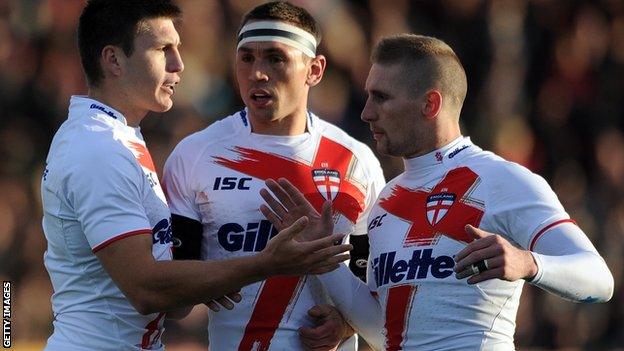2013 World Cup holds key to rugby league's future success
- Published
- comments

England's Tom Briscoe (left), Kevin Sinfield (centre) and Sam Tomkins
The Rugby Football League's chief executive Nigel Wood may have his critics, but when he labels 2013 as "rugby league's most important year since Super League began" it is impossible to disagree.
A hugely popular sport with the converted, the battle continues to attract new fans and new sponsors against the backdrop of worrying financial unrest at a number of elite clubs.
After Crusaders, Wakefield and Bradford battled back from the brink, now Salford, in their brand new stadium, are fighting to stay alive.
Youth key to England future - Lockyer
The opportunity to host the World Cup in Britain is one that the sport must wring every last drop out of to maximise exposure and showcase the best of the sport to a new audience.
A successful run from the home nations is key to creating the feel-good factor that surrounded minority sports in the Olympic Games.
Who would have dreamed of feeling rushes of adrenalin and passion supporting Team GB's handball or gymnastics teams before London 2012 came along? Now rugby league has the chance to get those success-hungry neutrals on board on home soil.
Gary Hetherington, chief executive of Super League champions Leeds says 2013 will be a "landmark" year for the sport. Former Great Britain star Jonathan Davies, a man who excelled in both codes of the sport, agrees.
"If you look at Super League it is a great product, unfortunately beset by financial problems," he says.
"It remains a great sport to watch but the challenge for league worldwide is obvious. They have to get the international game right and achieve what international rugby union has done.
"Get that media attention on to the international game as it is just not happening, and I do feel sometimes they have neglected that, which is going to be a huge problem. "
Easier said than done. An international game doesn't magically become more competitive just because you give it more media attention.
It is all very well hooking a new audience in, but you must keep them with a compelling product. And key to this will be a successful run from Steve McNamara's young England side.
"England have great talent and really have to push Australia and New Zealand," says Davies. "If you want the maximum exposure you have to go and win the World Cup. That would be a fantastic achievement."
So what chance of success? Hetherington describes the current England team as the best for over 20 years. Davies says the 2012 efforts of the union side in toppling the All Blacks should give the league boys hope.
"It is tough. New Zealand are world champions but Australia, as always are the team to beat," he says.
"We have such talented youngsters coming through and for the first time we have players who can score tries out of nothing like Sam Tomkins and Ryan Hall.
"We need that game management at half-back, and the selection there will be interesting from McNamara. We do have the forwards who can push them. It is about belief more than anything.
"We always seem to look up at and follow the Australian game. We are maybe worrying about them more than ourselves, so if Steve can instil belief then why can't we replicate what the union boys did and beat them?"
The domestic game meanwhile remains as dazzling as it is concerning. Thrilling Super League and Challenge Cup games serve as a weekly reminder that this pulsating sport has a lot going for it. But as the fight for survival off the pitch continues, so questions persist about the sustainability of the current Super League format.
The 14-team top tier, the licensing system rather than promotion and relegation, the salary cap, expansion. They are all issues that need looking at, and all issues that continue to split opinion when debating the financial health of rugby league.
The RFL insists all it can do is provide the best possible environment for clubs to flourish and then it is up to the clubs to keep their own houses in order.
Yet the ultimate responsibility for the health of the British game lies with its governing body. They will be as concerned by Bradford, and now Salford's travails, as they will be buoyed by the breathtaking sporting theatre that the top clubs continue to provide to a passionate and loyal fan base.
On the pitch Leeds will bid to maintain their remarkable modern stranglehold on the Grand Final. The champions will start as fourth favourites to retain their title, with Warrington the bookmakers pre-season choice to lift the Old Trafford silverware.
Wigan and St Helens will of course be fancying their chances, and look out for Hull FC this year.
The return to Super League of Gareth Ellis should give the Black and Whites a great shot at a successful season.
- Published18 December 2012
- Published26 October 2012
- Published31 August 2012